Super User
ANDRITZ to supply complete OCC line to United Paper, Thailand
International technology Group ANDRITZ has received an order from United Paper Public Company Limited (“United Paper”) to supply a complete OCC line for its mill in Prachinburi, Thailand. Start-up is scheduled for the second quarter of 2022.
ANDRITZ will supply the main equipment – from pulping to the storage tower – featuring the following technological highlights:
- LC pulping system comprising a FibreSolve FSR pulper with newly designed rotor and TrashWell standpipe for efficient reject removal as well as state-of-the-art detrashing machinery. The new pulping system not only enables excellent slushing of the raw material at minimum fiber loss, but also focuses on efficient separation and removal of rejects with highest availability.
- Innovative PrimeScreens X for screening and fractionation with new PrimeRotors for superior screening performance, savings in energy consumption by up to 25% as well as fast and easy maintenance.
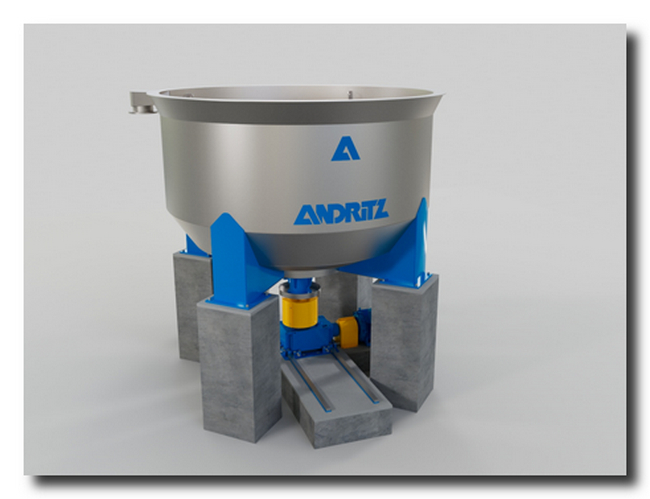 ANDRITZ FibreSolve FSR pulper with new rotor design “Photo: ANDRITZ”.
ANDRITZ FibreSolve FSR pulper with new rotor design “Photo: ANDRITZ”.
The new OCC line will have a design capacity of 550 bdmt/d and process a mixture of AOCC and LOCC to produce linerboard. The scope of supply also includes the detailed engineering and supervision of installation, commissioning and start-up.
Wachara Chinsettawong, Deputy Managing Director, United Paper, says: “The benefits related to energy savings and maintenance as well as the excellent performance we are having from the first line that ANDRITZ delivered to us were the main reasons for our decision to trust in ANDRITZ once more.”
This order once again strengthens ANDRITZ’s leading position as a supplier of OCC lines in Thailand.
United Paper Public Company Limited was founded in 2004 and is an important producer of various kraft paper grades for linerboard and corrugated medium.
ANDRITZ GROUP
International technology group ANDRITZ offers a broad portfolio of innovative plants, equipment, systems and services for the pulp and paper industry, the hydropower sector, the metals processing and forming industry, pumps, solid/liquid separation in the municipal and industrial sectors, as well as animal feed and biomass pelleting. Plants for power generation, flue gas cleaning, recycling, and the production of nonwovens and panelboard complete the global product and service offering. Innovative products and services in the industrial digitalization sector are offered under the brand name Metris and help customers to make their plants more user-friendly, efficient and profitable. The publicly listed group has around 26,950 employees and more than 280 locations in over 40 countries.
ANDRITZ PULP & PAPER
ANDRITZ Pulp & Paper provides equipment, systems, complete plants and services for the production of all types of pulp, paper, board and tissue. The technologies and services focus on maximum utilization of raw materials, increased production efficiency and sustainability as well as lower overall operating costs. Boilers for power generation, flue gas cleaning systems, plants for the production of nonwovens and panelboard (MDF), as well as recycling and shredding solutions for various waste materials also form a part of this business area. State-of-the-art IIoT technologies as part of Metris digitalization solutions complete the comprehensive product offering.
Full-line supplier Voith receives order from Shandong Huatai Paper to rebuild PM 11 for production of woodfree uncoated paper
In response to changing market demand, Shandong Huatai Paper decided to rebuild and modernize PM 11 in order to progressively convert newsprint production to high-quality graphic paper. The paper producer selected the full-line supplier Voith as a suitable partner. After the rebuild, the production line will have a significantly increased annual capacity of 520,000 tons at a design speed of 1,800 m/min. The rebuilt production plant, located in the eastern Chinese province of Shandong, will start up in 2023.
- Shandong Huatai Paper, one of the world's largest newsprint producers, commissions the full-line supplier Voith with the rebuild of PM 11
- After the rebuild, the state-of-the-art machine produces wood-free uncoated paper with significantly increased productivity
- Voith already supplied the customer with various paper machines for the efficient production of newsprint in the past years and successfully rebuilt PM 10 to graphic paper
"We are very pleased that Shandong Huatai Paper has chosen us again," says Hanson Zhao, Vice President Sales and Application Asia at Voith. "Our leading technologies, long-standing partnership and very good results were decisive in winning the order. After the paper machine rebuild, the system will be one of the most powerful of its kind in the world. With Voith's state-of-the-art solutions and outstanding service competence, Shandong Huatai Paper benefits from optimized plant production and paper quality."
"With the rebuild of PM 11, we are aiming for a stronger positioning in the segment of high-quality graphic paper," says Wei Lijun, Vice General Manager at Shandong Huatai Paper. "We are glad to have found a strong and reliable partner in Voith by our side. The order is another milestone in our successful business relationship."
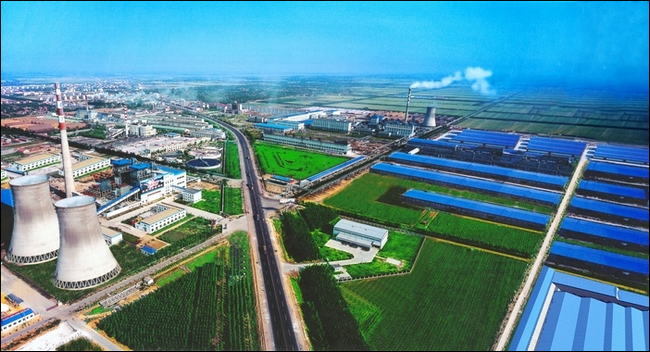 Voith Huatai PM11
Voith Huatai PM11
With the help of leading Voith technologies, the annual capacity of PM 11 will be significantly increased. The tailor-made package enables state-of-the-art paper production, focusing on the efficiency, stability and reliability of the plant. In addition, the solutions ensure more sustainable production by minimizing the carbon footprint and reducing water and fiber consumption. Among other things, a new MasterJet Pro G headbox is used, which improves paper quality while enabling significant savings in energy costs. In addition, Voith experts are upgrading the forming section similar to the DuoFormer concept to achieve optimum formation and higher throughput. New ProRelease+ HighEnd boxes in the pre-dryer section guarantee improved web stability at high speeds. Futhermore, a SpeedSizer AT with its smooth film application will ensure even and high-quality paper profiles. In the after-dryer section, the efficient CombiDuoRun drying concept will be installed. The scope of supply also includes new automation solutions to efficiently upgrade the existing control systems.
Shandong Huatai Paper is one of the world's largest newsprint producers, with an annual production of 1.5 million tons. As a long-standing partner, the customer has already commissioned Voith with various orders for new plants. For the rebuild project of PM 10 to graphic paper, Shandong Huatai Paper also decided to work with Voith. The full-line supplier Voith successfully completed this project in 2016.
About Shandong Huatai Paper
Shandong Huatai Paper is part of the Huatai Group. As a major global player, the company mainly produces and sells paper products, including newsprint, graphic paper and pulp products. The group is the world's largest producer of newsprint and the largest producer in the chlor-alkali industry in China. The company sells its products domestically and overseas.
About the Voith Group
The Voith Group is a global technology company. With its broad portfolio of systems, products, services and digital applications, Voith sets standards in the markets of energy, oil & gas, paper, raw materials and transport & automotive. Founded in 1867, the company today has more than 20,000 employees, sales of € 4.2 billion and locations in over 60 countries worldwide and is thus one of the larger family-owned companies in Europe.
The Group Division Voith Paper is part of the Voith Group. As the full-line supplier to the paper industry, it provides the largest range of technologies, services and products on the market and offers paper manufacturers holistic solutions from a single source. The company’s continuous stream of innovations facilitates resource-conserving production and helps customers minimize their carbon footprint. With its leading automation products and digitalization solutions from the Papermaking 4.0 portfolio, Voith offers its customers state-of-the-art digital technologies to improve plant availability and efficiency for all sections of the production process.
Nonwovens Lamination
What is Lamination?
Lamination is the process of manufacturing a material in multiple layers, so that the combined physical and mechanical characteristics of each layer make for a stronger, more resilient composite material.
- What is Lamination?
- Nonwovens Lamination main areas of application
- Nonwovens Lamination techniques and advantages
- The Best Nonwovens Lamination machine
The earliest examples of lamination made use of natural adhesives such as beeswax, gums, tar and substances derived from animal bones. As technology progressed, we discovered the use of sealing wax as the first hot-melt adhesive. In the 1930s a wet lamination process (with the use of solvents) was used to bond shirt collars (a woven fabric) with cellulose acetate. This process was deemed inconvenient, and by 1948 progress was made in dry lamination using polyvinyl acetate plasticized with dibutyl phthalate.
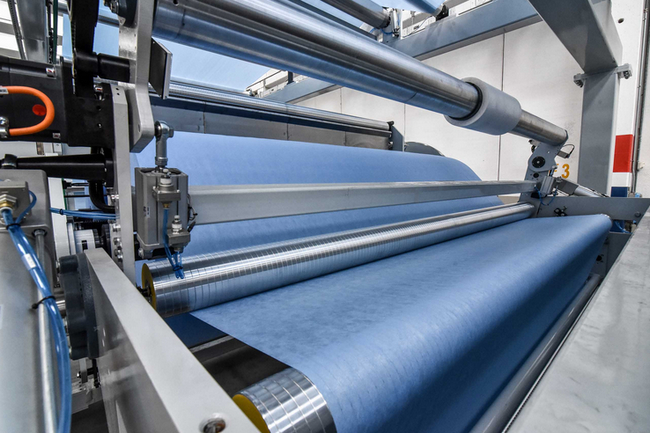
Nonwovens lamination, in particular, is the process of bonding two or more layers, at least one of which is a nonwoven fabric, with the objective of obtaining improved strength, stability, sound insulation, appearance, or other properties. Although less expensive to manufacture, nonwoven fabrics tend to be weaker than woven ones, and the lamination process comes into play just when there is the need to strengthen this nonwoven material for a variety of uses.
The bonding is typically done with the use of adhesives (or heat) and pressure, making it possible to manufacture nonwovens products, equipped with a waterproof layer, that are breathable, soft, comfortable and suitable for printing.
Shortly after the beginning of the industrial production of disposable diapers, nonwoven laminated products, such as the textile backsheet, appeared. From the early days of dry lamination various adhesives were produced, including hot-melt powders.
Breathability was an issue with lamination in the early days, but the processes used today are capable of producing breathable, porous materials that maintain their waterproof properties.
Valmet to supply a multifuel boiler to Kipaş Kağit Sanayi Isletmeleri A.Ş.’s paper mill in Turkey
Valmet will supply a multifuel power boiler and auxiliary process equipment to Kipaş Kağit Sanayi Isletmeleri A.Ş.’s paper mill in Kahramanmaraş, Turkey. The new boiler will improve the reliability of the paper mill’s steam and electricity supply. Additionally, its steam production capacity will be sufficient for the mill’s future paper machine PM 4.
The order was included in Valmet’s orders received of the second quarter 2021. Typically, the value of this kind of order is in the range of EUR 25–35 million. The boiler plant startup is scheduled for the third quarter of 2023.
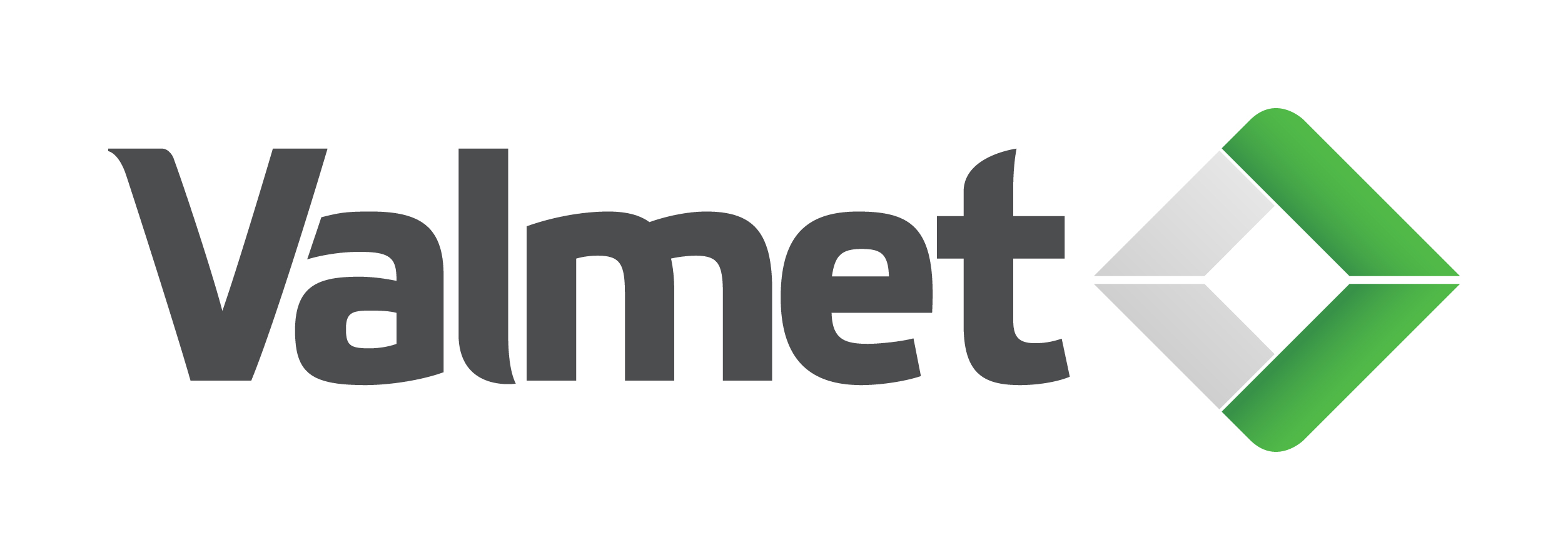 “We are very happy with Valmet’s way of working and the excellent cooperation in our earlier boiler plant project. We find Valmet’s technology reliable and appreciate its environmental friendliness,” says Sinem Öksüz Dedebayraktar, Board Member of Kipaş Kağit Sanayi Isletmeleri A.Ş.
“We are very happy with Valmet’s way of working and the excellent cooperation in our earlier boiler plant project. We find Valmet’s technology reliable and appreciate its environmental friendliness,” says Sinem Öksüz Dedebayraktar, Board Member of Kipaş Kağit Sanayi Isletmeleri A.Ş.
“This is a repeat order from Kipaş Holding, as we have supplied an identical plant earlier to their greenfield paper mill in Söke, Turkey. We value the customer’s trust in us highly,” says Kai Janhunen, Vice President, Energy Business Unit, Valmet.
Technical information about Valmet’s delivery
Valmet’s delivery includes a Valmet CFB Boiler for co-firing paper and water treatment sludge, plastic rejects and coal. The boiler will utilize circulating fluidized bed (CFB) technology, and the boiler plant will have a steam production capacity of 260 tons per hour (114 bar, 542 °C). The delivery also includes a Valmet Electrostatic Precipitator, a Valmet Bag House Filter, a Valmet DNA Automation System and spare parts.
Information about the customer Kipaş Kağit Sanayi Isletmeleri A.Ş.
Kipaş Kağit Sanayi Isletmeleri A.Ş. started as a joint venture of Kipaş Holding in 2011 and produces high-quality containerboard paper from waste paper. Currently, Kipaş has two paper machines: PM 1 in Kahramanmaraş with an annual production capacity of 450,000 tons and PM 2 in Söke with a production capacity of 720,000 tons of coated grades.
Valmet is the leading global developer and supplier of process technologies, automation and services for the pulp, paper and energy industries. We aim to become the global champion in serving our customers.
Valmet’s strong technology offering includes pulp mills, tissue, board and paper production lines, as well as power plants for bioenergy production. Our advanced services and automation solutions improve the reliability and performance of our customers’ processes and enhance the effective utilization of raw materials and energy.
Valmet’s net sales in 2020 were approximately EUR 3.7 billion. Our 14,000 professionals around the world work close to our customers and are committed to moving our customers’ performance forward – every day. Valmet’s head office is in Espoo, Finland and its shares are listed on the Nasdaq Helsinki.
Read more www.valmet.com
International Paper Announces the Record Date and Distribution Date in Connection with the Spin-off of its Printing Papers Business
International Paper (NYSE: IP) today announced the timing and additional details regarding the spinoff of its Printing Paper business, which will be known as Sylvamo Corporation ("Sylvamo"). As previously announced, immediately following the spinoff of the Printing Papers business to International Paper shareholders, Sylvamo will be a new, publicly-traded company, to be listed on the New York Stock Exchange ("NYSE").
International Paper shareholders as of 5:00 p.m. New York City time on September 15, 2021, the record date set by the International Paper board of directors for the distribution of Sylvamo shares, will be entitled to receive a number of shares of Sylvamo common stock at 12:01 a.m. New York City time on the distribution date, October 1, 2021. The distribution ratio is expected to be one share of Sylvamo common stock for every 11 shares of International Paper common stock. International Paper will announce the definitive distribution ratio promptly after the record date.
 International Paper shareholders will not receive fractional shares of Sylvamo common stock. Instead, fractional shares of Sylvamo common stock will be aggregated and sold in the open market, with the net proceeds distributed pro rata in cash payments to the International Paper shareholders who would otherwise receive a fractional share of Sylvamo common stock.
International Paper shareholders will not receive fractional shares of Sylvamo common stock. Instead, fractional shares of Sylvamo common stock will be aggregated and sold in the open market, with the net proceeds distributed pro rata in cash payments to the International Paper shareholders who would otherwise receive a fractional share of Sylvamo common stock.
Sylvamo common stock is expected to begin trading on a "when-issued" basis on the NYSE under the symbol "SLVM WI" beginning on September 14, 2021. On October 1, 2021, "regular way" trading under the symbol "SLVM" is expected to begin. The CUSIP number for the Sylvamo common stock will be 871332 102 when regular way trading begins.
International Paper has been advised by the NYSE that from September 14, 2021 through the distribution date, there will be two markets for International Paper common stock: a "regular way" market and an "ex-distribution" market. Shares of International Paper common stock will continue to trade "regular way" on the NYSE under the symbol "IP" through September 30, 2021 and thereafter. Any holders of shares of International Paper common stock who sell International Paper shares regular way on or before September 30, 2021 will also be selling their right to receive shares of Sylvamo common stock. Additionally, holders of shares of International Paper common stock who sell in the "ex-distribution" market on or before September 30, 2021 (which will trade under the symbol "IP WI" on the NYSE), will be selling only his or her shares of International Paper common stock and will be retaining his or her right to receive shares of Sylvamo common stock in the spinoff distribution. Investors are encouraged to consult with their financial advisors regarding the specific implications of buying or selling Sylvamo common stock on or before the distribution date.
No action or payment is required by International Paper shareholders to receive the shares of Sylvamo common stock in the spinoff distribution. Shareholders who hold International Paper common stock on the record date will receive a book-entry account statement reflecting their ownership of Sylvamo common stock or their brokerage account will be credited with the Sylvamo shares.
The receipt of Sylvamo common stock in the distribution will be tax-free to International Paper stockholders for U.S. federal income tax purposes, except for the gain or loss attributable to cash received in lieu of fractional shares of Sylvamo common stock. International Paper shareholders are urged to consult with their tax advisors with respect to the U.S. federal, state and local or foreign tax consequences, as applicable, of the spin-off.
A registration statement on Form 10 relating to the Sylvamo common stock has been filed with the SEC, but has not yet become effective. The distribution is subject to the satisfaction or waiver of a number of conditions described in the registration statement on Form 10, filed by Sylvamo with the Securities and Exchange Commission ("SEC"). International Paper also reserves the right to withdraw and cancel the distribution if, at any time prior to the distribution date, the board of directors of International Paper determines, in its sole discretion, that the distribution is not in the best interest of International Paper or its shareholders, or that market conditions are such that it is not advisable to consummate the distribution. This press release shall not constitute an offer to sell or the solicitation of an offer to buy these securities in any state or jurisdiction in which such offer, solicitation or sale would be unlawful prior to registration or qualification under the securities laws of any state or jurisdiction.
About International Paper
International Paper (NYSE: IP) is a leading global producer of renewable fiber-based packaging, pulp and paper products with manufacturing operations in North America, Latin America, Europe, North Africa and Russia. We produce corrugated packaging products that protect and promote goods, and enable world-wide commerce; pulp for diapers, tissue and other personal hygiene products that promote health and wellness; and papers that facilitate education and communication. We are headquartered in Memphis, Tenn., employ approximately 48,000 colleagues and serve more than 25,000 customers in 150 countries. Net sales for 2020 were $21 billion. For more information about International Paper, our products and global citizenship efforts, please visit internationalpaper.com.
Valmet to invest in a new service center in Guangxi, China
Valmet will build its fourth service center in China, in the city of Beihai, to further develop its local presence in the fast-growing pulp and paper industry in the Guangxi province. Valmet's new Guangxi Service Center will be in operation by the fourth quarter in 2023.
Valmet’s new service center will serve pulp, board, paper and tissue customers close by with main focus on roll maintenance, fiber equipment services and field services including shutdown planning management.
 “Guangxi Zhuang Autonomous Region is a fast-growing area in China where we see our customers investing heavily, for example, in board and fiber lines. Being close to our customers is one of our core commitments. Establishing Guangxi Service Center is an important step to further strengthen our local presence. We will be able to serve our customers better than ever before,” says Aki Niemi, Business Line President, Services, Valmet.
“Guangxi Zhuang Autonomous Region is a fast-growing area in China where we see our customers investing heavily, for example, in board and fiber lines. Being close to our customers is one of our core commitments. Establishing Guangxi Service Center is an important step to further strengthen our local presence. We will be able to serve our customers better than ever before,” says Aki Niemi, Business Line President, Services, Valmet.
"Our customers in Guangxi and the surrounding areas will strongly benefit from this new service center, which enables us to reduce the response and delivery times and have the needed expertise more easily available. Additionally, our customers will be closer to Valmet’s best technologies, products and services for maximized reliability and optimized performance," says Xiangdong Zhu, Area President, China, Valmet.
In addition to this new Guangxi Service Center, Valmet has three other service centers in China – in Wuxi, Guangzhou and Zibo. In total, Valmet has over 100 service centers around the world.
Valmet is the leading global developer and supplier of process technologies, automation and services for the pulp, paper and energy industries. We aim to become the global champion in serving our customers.
Valmet's strong technology offering includes pulp mills, tissue, board and paper production lines, as well as power plants for bioenergy production. Our advanced services and automation solutions improve the reliability and performance of our customers' processes and enhance the effective utilization of raw materials and energy.
Valmet's net sales in 2020 were approximately EUR 3.7 billion. Our 14,000 professionals around the world work close to our customers and are committed to moving our customers' performance forward - every day. Valmet's head office is in Espoo, Finland and its shares are listed on the Nasdaq Helsinki.
Read more www.valmet.com
ABB/Voith alliance helps SCA to drive bold investment program forward
ABB’s appointment by Voith to deliver end customer electrification package enables SCA to transform kraftliner production capabilities at Swedish pulp and paper mill
ABB has been contracted by machine supplier Voith to deliver drives and electrification to support the build of SCA’s new kraftliner machine PM2 at its Obbola mill in Umeå, Sweden.
The contract is in addition to an automation and control system upgrade based on the ABB Ability™ System 800xA distributed control system (DCS), drives and instrumentation package that SCA awarded to ABB for the brownfield expansion, complementing ABB’s existing installed base and long-standing service agreement.
The installation of a new machine, infrastructure and optimized capabilities means that SCA’s annual production at Obbola will increase from the current 450,000 tonnes of kraftliner to 725,000 tonnes. The feat of bringing a brand new, large and wide machine online will meet the growing demand for renewable packaging with higher production capacity and efficiency.
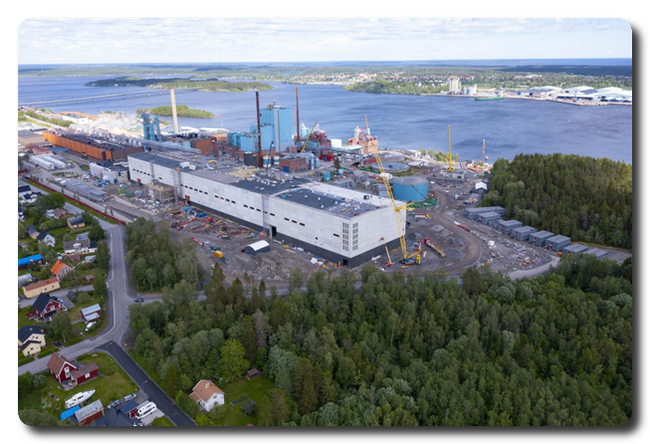
“Increased focus on sustainable packaging and e-commerce is boosting demand for high-quality packaging paper,” said Per Strand, Project Director at SCA. “The new machine from Voith and the associated ABB product selection will allow substantial increases in production and will allow the Obbola mill to meet increased market demands.”
Voith, as a full-line supplier, is taking responsibility for the entire papermaking process and project handling of the new Obbola mill. ABB’s scope includes sectional drives suitable for high power and high power density machines as well as specialized motor requirements, ABB Ability ™ System 800xA drive control system with ABB Ability ™ Data Logger tool and Safety PLC solution for the drive system safety functions.
“This contract allowed the opportunity to demonstrate ABB’s willingness to share a project scope with OEMs like Voith and serve the end customer in a way that harnesses our local presence and global know-how,” said Per-Inge Bengtsson, Sales Manager for ABB Pulp & Paper, Sweden.
“We are able to work closely with contracted parties to offer a more agile management style that enables us to better mitigate risks and balance expectations for both the OEM and customers.
ABB (ABBN: SIX Swiss Ex) is a leading global technology company that energizes the transformation of society and industry to achieve a more productive, sustainable future. By connecting software to its electrification, robotics, automation and motion portfolio, ABB pushes the boundaries of technology to drive performance to new levels. With a history of excellence stretching back more than 130 years, ABB’s success is driven by about 105,000 talented employees in over 100 countries. www.abb.com
Process Automation: ABB’s Process Automation business is a leader in automation, electrification and digitalization for the process and hybrid industries. We serve our customers with a broad portfolio of products, systems, and end-to-end solutions, including our #1 distributed control system, software, and lifecycle services, industry-specific products as well as measurement and analytics, marine and turbocharging offerings. As the global #2 in the market, we build on our deep domain expertise, diverse team and global footprint, and are dedicated to helping our customers increase competitiveness, improve their return on investment and run safe, smart, and sustainable operations.
Valmet to deliver key pulp technology to Nine Dragons’ new Beihai mill in China
Valmet has received several pulp technology orders from Nine Dragons for their pulp, paper and board greenfield project in Beihai city, Guangxi autonomous region, in China. The order consists of two complete fiberlines, two bleached chemi thermo mechanical pulp (BCTMP) lines, a recovery boiler and DeNOx scrubbers. The deliveries will be done in phases and the start-ups are scheduled for 2023.
The value of the order will not be disclosed. However, a project of this size and scope is typically valued at around EUR 140 million. The order was included in Valmet’s orders received of the second quarter 2021.
Nine Dragons is developing its production portfolio and building pulp mills to support its new and existing paper machines with high quality raw material.
“This project is the result of good cooperation between Nine Dragons and Valmet to find the optimum mill concept solution. I am happy to say that the outcomes are state-of-the-art process solutions, which will allow Nine Dragons to produce high quality pulp grades in a more sustainable way with excellent efficiency in energy and raw material utilization. We are committed to continuing to support Nine Dragons with the latest technology and strong local presence in China," says Zhu Xiangdong, Area President, China, Valmet.
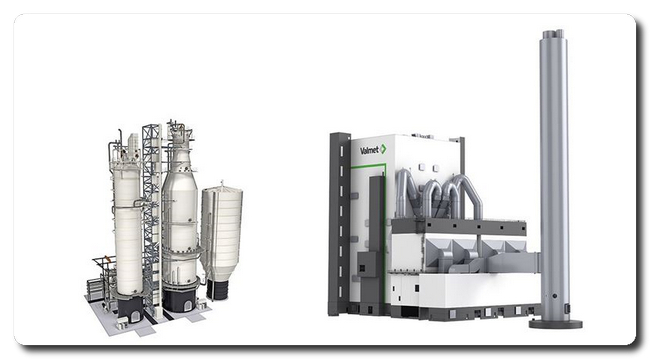 Valmet’s delivery includes latest Valmet Continuous Cooking technology and high power recovery boiler (Illustrative image)
Valmet’s delivery includes latest Valmet Continuous Cooking technology and high power recovery boiler (Illustrative image)
Technical details about the delivery
Valmet’s delivery includes two fiberlines, two BCTMP lines, a recovery boiler and DeNOx scrubbers for recovery boiler and lime kiln with the corresponding spare part packages.
The fiberlines will provide Nine Dragons with flexibility to produce pulp grades of different types. The new fiberlines provide possibilities to optimize pulp properties with lower power and wood consumption. This allows Nine Dragons to achieve excellent resource efficiency. The deliveries include Valmet Continuous Cooking G3, Valmet Screening, Valmet Refiner and Valmet Washing, Oxygen and Bleaching technologies.
The BCTMP lines include impregnation system, high consistency refining, bleaching system, low consistency refining, screening, dewatering and washing. It is designed to provide high yield, low energy consumption and excellent pulp quality for the new paper machines.
The recovery boiler has multiple high-power features, including multi-stage preheating of feedwater and heat recovery from flue and vent gases to combustion air. The boiler is designed for low emissions and high availability. The boiler also includes non-condensable gas (NCG) incineration. In addition, the delivery includes safety related systems and Boiler Diagnostics System for the recovery boiler.
The DeNOx scrubbers for recovery boiler and lime kiln are equipped with chemical feeding in order to achieve very low NOx emissions. The process can reduce emissions under the required 50 mg/Nm3 level with high availability and low maintenance need.
Information about the customer Nine Dragons
Nine Dragons Paper is engaged in the production and sale of packaging paperboard products, including linerboard (kraftlinerboard, testlinerboard, white top linerboard and coated duplex board), high performance corrugating medium, recycled printing & writing paper, specialty paper, high performance corrugated sheet, high performance corrugated box and pulp, providing one-stop packaging services for customers. The company has nine paper manufacturing sites and eight packaging sites in China, one paper manufacturing mill in Vietnam, one pulp mill in Malaysia and four pulp and paper mills in the United States. The aggregated annual production capacity of pulp and paper is over 18 million tonnes.
About Valmet:
Valmet is the leading global developer and supplier of process technologies, automation and services for the pulp, paper and energy industries. We aim to become the global champion in serving our customers.
Valmet's strong technology offering includes pulp mills, tissue, board and paper production lines, as well as power plants for bioenergy production. Our advanced services and automation solutions improve the reliability and performance of our customers' processes and enhance the effective utilization of raw materials and energy.
Valmet's net sales in 2020 were approximately EUR 3.7 billion. Our 14,000 professionals around the world work close to our customers and are committed to moving our customers' performance forward - every day. Valmet's head office is in Espoo, Finland and its shares are listed on the Nasdaq Helsinki.
Read more www.valmet.com
Toscotec to supply a turnkey tissue line to Vajda Papír in Hungary.
Toscotec will supply an AHEAD 2.2L tissue line on a turnkey basis to Vajda Papír at its Dunaföldvár mill, near Budapest, Hungary. The start-up is planned for the first half of 2022.
The new AHEAD 2.2L machine features a net sheet width of 5,600 mm, a maximum operating speed of 2,200 mpm, and a production capacity of over 80,000 tons/year. The machine is equipped with the fully hydraulic TT Headbox-MLT, TT NextPress of upgraded design, a third-generation TT SYD, gas fired TT Hood and Air System engineered with several steps of energy recovery.
The turnkey supply includes the complete stock preparation system, Toscotec’s patented TT SAF® (Short Approach Flow) with a double dilution system designed to ensure a reduction of electrical consumption. The electrification and controls, dust and mist removal systems, boiler plant, bridge cranes, air compressor station, roll handling and wrapping systems, and hall ventilation with conditioning system complete the production line. The scope also includes one OPTIMA 2600 slitter rewinder fitted with automatic shaft puller and dedicated dust removal system. Vajda Papír also purchased a comprehensive service package with detailed mill engineering, erection, commissioning, start-up assistance, and training.
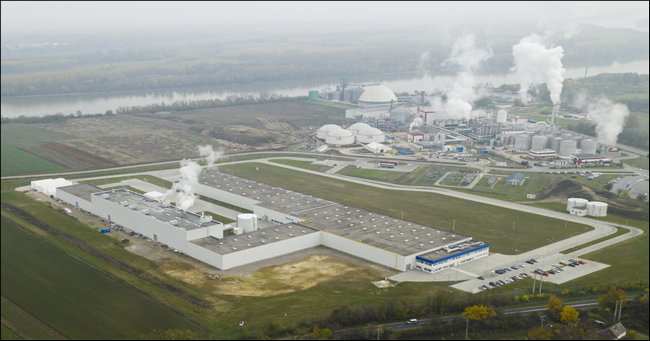
Attila Vajda, owner and managing director of Vajda Papír, says, “We found in Toscotec the right partner to realize our expansion strategy according to plan. Based on their extensive experience with turnkey operations, our confidence in Toscotec’s ability to successfully complete complex tissue projects on a tight timeframe was a key factor in our decision. At Vajda Papír we select the most advanced and energy efficient technology to manufacture premium tissue quality for our customers and consumers.”
Marco Dalle Piagge, sales director of Toscotec, comments: “We are very happy to begin an important partnership with Vajda Papír. Toscotec strengthens its position as global leading supplier of turnkey solutions for the tissue industry. Delivering a complete tissue line on a turnkey basis according to schedule, and assuming responsibility for the achievement of performances for the entire supply requires significant expertise. We are the only tissue machinery manufacturer with nearly 20 years of experience in turnkey projects across 4 continents.”
Matteo Giorgio Marrano, Toscotec sales manager, says, “With Vajda Papír’s order, Toscotec increases its market penetration in Eastern Europe with three major tissue projects sold in the last two years, including two double-width machines. This new line will be equipped with advanced and energy-efficient technology, including Toscotec’s shoe press and TT SYD of latest generation, and high-recovery TT Hood.”
About Vajda Papír Kft.
Founded in 1999, Vajda Papír is headquartered in Budapest and operates 3 sites in Budapest, Székesfehérvár and Hungary’s biggest and most modern integrated tissue mill at Dunaföldvár, south of Budapest. It manufactures 110,000 tons/year of toilet tissue, handkerchiefs, towels, and napkins. Vajda Papír owns the famous brands Ooops, Sindy, Star and Lilla and distributes its products to the consumer and AfH markets in Eastern Europe.
For further information, please contact:
Matteo Giorgio Marrano, Area Sales Manager, Tissue division, This email address is being protected from spambots. You need JavaScript enabled to view it.
Valmet’s climate program targets approved by the Science Based Targets initiative
Valmet introduced its climate program – Forward to a carbon neutral future – in March 2021 with CO2 emission reduction targets for its entire value chain. Now Valmet has got its climate program targets approved by the Science Based Targets initiative (SBTi). This approval means that Valmet´s climate targets support the Paris Climate Agreement’s goal to limit global warming to 1.5°C and are based on the latest climate science.
In its climate program Valmet is targeting to reduce CO2 emissions from its own operations by 80 percent and 20 percent in its supply chain by 2030. Valmet also targets to enable carbon neutral production for all its pulp and paper industry customers by 2030 by developing new technologies. Valmet is also improving the energy efficiency of its current technology offering by 20 percent. The baseline year for the CO2 reduction targets is 2019.
 “Valmet believes that technology plays a key role in mitigating climate change and global warming and the transition to a carbon neutral economy. We are happy that the Science Based Targets initiative has approved our climate program targets as contributing to the limiting of global warming to the targeted 1.5oC level. With concrete actions we will significantly reduce our own and customers’ carbon footprint and support our suppliers to do the same. Valmet is strongly committed to be the preferred partner for our customers on their journey to carbon neutrality,” says Pasi Laine, President and CEO, Valmet.
“Valmet believes that technology plays a key role in mitigating climate change and global warming and the transition to a carbon neutral economy. We are happy that the Science Based Targets initiative has approved our climate program targets as contributing to the limiting of global warming to the targeted 1.5oC level. With concrete actions we will significantly reduce our own and customers’ carbon footprint and support our suppliers to do the same. Valmet is strongly committed to be the preferred partner for our customers on their journey to carbon neutrality,” says Pasi Laine, President and CEO, Valmet.
Valmet has been recognized for its actions and strategy to mitigate climate change by maintaining leadership position in CDP's climate program ranking since 2016. Valmet has also been included in the Dow Jones Sustainability Indices since 2014.
About Valmet’s climate program – Forward to a carbon neutral future
Valmet’s climate program includes ambitious CO₂ emission reduction targets and concrete actions for the whole value chain, including Valmet’s supply chain, own operations, and the use of Valmet’s technologies by its customers. The program is aligned with the Paris Climate Agreement’s 1.5°C pathway and the United Nations Sustainable Development Goals.
About The Science Based Targets initiative (SBTi)
The Science Based Targets initiative (SBTi) is a collaboration between CDP, the United Nations Global Compact, World Resources Institute (WRI) and the World Wide Fund for Nature (WWF). SBTi defines and promotes best practice in science-based target setting and independently assesses companies’ targets.
Valmet is the leading global developer and supplier of process technologies, automation and services for the pulp, paper and energy industries. We aim to become the global champion in serving our customers.
Valmet's strong technology offering includes pulp mills, tissue, board and paper production lines, as well as power plants for bioenergy production. Our advanced services and automation solutions improve the reliability and performance of our customers' processes and enhance the effective utilization of raw materials and energy.
Valmet's net sales in 2020 were approximately EUR 3.7 billion. Our 14,000 professionals around the world work close to our customers and are committed to moving our customers' performance forward - every day. Valmet's head office is in Espoo, Finland and its shares are listed on the Nasdaq Helsinki.
Read more www.valmet.com
